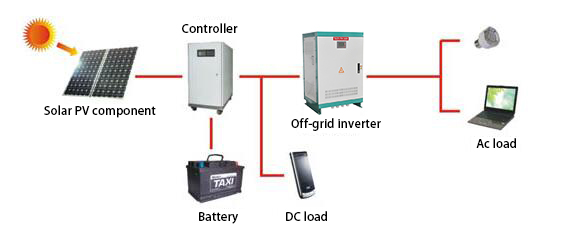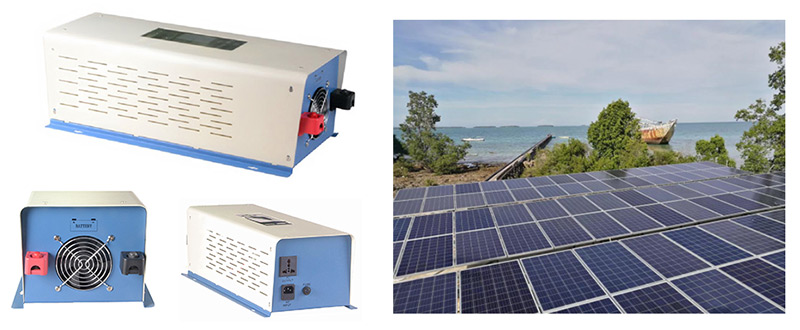As renewable energy becomes increasingly popular, understanding the components that make it possible is essential. One such crucial component is the off-grid inverter. This blog explores what off-grid inverters are, how they work, their applications, scope of use, and advantages compared to grid-connected inverters.
An off-grid inverter, also known as a standalone inverter, is a device that converts the direct current (DC) produced by renewable energy sources like solar panels or wind turbines into alternating current (AC) used by most household appliances. An off-grid inverter is a crucial component in an independent power system, particularly for areas without access to a traditional power grid. It converts the direct current (DC) power stored in batteries into alternating current (AC) power, typically at 220V, which is suitable for most household and commercial applications. Off-grid inverters also perform the reverse function, converting AC power from the grid into DC power to charge the batteries. This dual functionality makes them essential for solar power generation systems, which rely on stored solar energy to provide electricity in remote locations such as deserts, mountains, and forests.
How do off-grid inverters work?
Off-grid inverters use advanced technology to convert DC power from batteries into AC power. This process involves:
- DC-AC Conversion: The inverter boosts the DC input voltage using a push-pull mechanism and then uses an inverter bridge with SPWM (Sinusoidal Pulse Width Modulation) technology to produce a stable 220V AC output.
- Power Management: They manage the flow of power between the batteries and the electrical load, ensuring that devices receive a consistent and reliable power supply.
- Charging Capability: Many off-grid inverters also include a solar charge controller and an automatic generator starter module, which help manage the charging of batteries from solar panels and backup generators, respectively.

Applications of off-grid inverters
Remote areas: Off-grid inverters are ideal for powering homes and businesses in remote areas without access to the main electrical grid. They enable the use of renewable energy sources to generate electricity independently.
Backup power: In regions prone to outages, off-grid inverters provide reliable backup power. By storing energy in batteries, they ensure continuous power during grid failures.
Mobile applications: Off-grid inverters are used in mobile applications such as RVs, boats, and caravans. They allow travelers to enjoy the comforts of home while on the move.
Emergencies: During natural disasters or emergencies, off-grid inverters can be crucial in providing power for essential services, such as communication devices, medical equipment, and lighting. Solar inverters ensure that critical functions remain operational when the main power grid is compromised.
The scope of use of off-grid inverters
The scope of off-grid inverters extends across various sectors, including residential, commercial, agricultural, and industrial. Their ability to provide power independently makes them suitable for:
- Rural electrification: Bringing electricity to rural and underserved areas.
- Disaster relief: Offering a reliable power source in emergency and disaster relief operations.
- Sustainable living: Supporting off-grid living and sustainable lifestyle choices.
- Agricultural operations: Powering irrigation systems, livestock facilities, and other agricultural needs.
Off-grid vs. grid-connected inverters?
Off-Grid Inverters
- Independent power source: Creates a standalone power grid, controlling voltage and ensuring power supply without reliance on the main grid.
- Energy storage: Requires batteries to store energy, providing power even when solar generation is low or during the night.
- Adaptability: Can handle various types of electrical loads and ideal for emergency power and outdoor use.
Grid-Connected Inverters
- Grid integration: Sends energy directly to the main grid, synchronizing with grid frequency and phase.
- No energy storage: A grid-connected inverter does not require batteries, as it delivers power directly to the grid.
- Limited control: Cannot regulate energy delivery; power generated is immediately sent to the grid.

Advantages of off-grid inverters
- Independence: Off-grid inverters operate independently without relying on external grid support, enabling self-sufficient operation. This independence makes them especially suitable for remote areas or locations that cannot access the grid, such as mountains, deserts, and islands. The 700W off-grid solar inverter, for example, provides a reliable power solution in these isolated regions, ensuring that basic power needs are met without external assistance.
- Stability and reliability: Off-grid inverters can stably output AC power, ensuring a stable and reliable energy supply unaffected by distance and space limitations. Additionally, they come with multiple safety protection measures, such as overvoltage protection, and short-circuit protection, ensuring safe operation.
- Efficiency and environmental friendliness: Off-grid inverters operate through solar energy systems, producing no pollutants or carbon dioxide emissions, achieving truly clean energy and saving on energy costs. Moreover, they offer high efficiency, low noise, and low maintenance, providing users with a stable and reliable power supply.
- Adaptability and flexibility: Off-grid inverters can operate under various environmental conditions, whether for homes, businesses, or industrial areas, meeting diverse power needs. Additionally, they can store excess energy for future use, serving as a backup power source to handle sudden power outages or disaster situations.
- Economic viability: For areas unable to connect to the grid or where grid power is unstable, off-grid inverters provide an economically feasible power solution. While the initial investment in off-grid inverters may be high, in the long run, the energy cost savings and environmental benefits make this investment very valuable.
Off-grid inverters play a vital role in the transition to renewable energy and sustainable living. They offer numerous benefits, including energy independence, reliability, and environmental sustainability. As technology advances, off-grid inverters are becoming more efficient, affordable, and accessible, making them a viable option for a wide range of applications. Whether you're looking to power a remote cabin, provide backup power for your home, or embark on a sustainable lifestyle, understanding off-grid inverters is a step in the right direction.
Home Power Inverter offers two types of off-grid solar inverters to meet the needs of your various photovoltaic projects. First, we have a multifunction inverter/charger with a power range from 700W to 6000W, supporting 12V/24V/48V DC input and converting it to 120V/220V/230V AC output. This inverter integrates both inversion and battery charging functions, providing continuous and stable power support with its portable size. The other option is a three-phase pure sine wave inverter with a power range from 8kW to 200kW, designed without battery storage. It features an intelligent LCD display setting and robust protection functions. Both inverters are particularly suitable for remote areas, such as cabins and rural regions, where access to the main power grid may be limited or unavailable. They are ideal choices tailored for standalone power systems. You can now check the discounted prices of our off-grid inverters online and start choosing the right inverter for your home power needs.

So this is converting battery power to ac power to charge a battery.
that is one losing proposition.
well I was going to make an off grid system but since you say it can't be done and will cost too much, I'll find someone who understands what they are talking about